

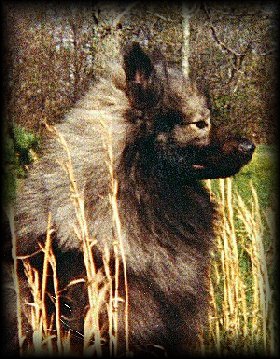

 Intro
Intro
 Importance of spay, neuter
Importance of spay, neuter
 When does a dog get
old?
When does a dog get
old?
 What is special about an old
dog?
What is special about an old
dog?
 Attitude & Involvement
Attitude & Involvement
 Vaccinations
Vaccinations
 Coat, Skin, and Feeding
Coat, Skin, and Feeding
 Supplements
Supplements
 Unnecessary procedures
Unnecessary procedures
 Grooming
Grooming
 When & how to say
"goodbye"
When & how to say
"goodbye"
 Herbs to use
Herbs to use

A senior dog might be a retired show dog, an obedience dog, an agility dog, or any
dog that is in his "golden" years. When covering this part, it will be assumed that the
senior dog is a companion animal. It makes no difference whether the senior is a dog
or bitch, because it will be assumed the dog has been spayed or neutered, as all dogs
should be upon reaching old age. The senior will be referred to as "old dog", "senior",
or "dog" or "he" even though it may be a "she". As with the rest of the series,
interjected are my beliefs, others may differ. The routine, care an feeding are what has
worked for me. Others may have different results and routines.
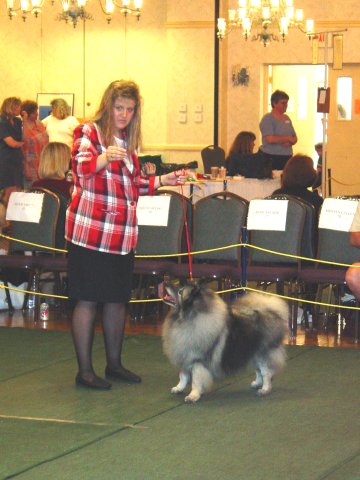
As a general note, the suggestions contained may not work for every dog. There
are individual cases that may be sensitive to herbs and additives mentioned. If your
dog reacts negatively to any treatment or additive, discontinue it. Consult your
veterinarian or other experienced people if you are not sure.
Before reaching old age, if you have not had your dog spayed or neutered, you
should. Dogs that are intact beyond 7 years of age have a much higher risk of cancers.
The age of an old Kees comes somewhere between 7 and 11 years. Some don't
start getting old dog problems until later and some develop problems earlier. "Kilroy", who was
fourteen when he died, I classified as "old" when at age ten when he started having
problems with a weakening rear. I have a twelve year old female that still acts like and
has the body of a four year old and has not been classified as "old" yet.
Kees live to be an average of thirteen years old. Some make it longer and I have
heard of Kees as old as nineteen before their time came to go. Old dogs are special and everyone should have the experience of having one. I
don't know how to explain them to do them justice, but they have the wisdom and the
memories locked up in their brains of the special times shared with you. You can look
them in the eyes at any time and know they love you and trust you completely. They
have a lifetime of memories and the only ones they remember are the good ones, I am
sure. They should be treated special and be given the time and love they need to
complete their life cycle.
The main things to be concerned with in a Senior are diet, care and attitude.
Involve the Senior dog in dog activities and/or with the family. Old dogs need to be
included and add to the enjoyment of your other pets. Because they are aging, they
need to feel part of things. They also need some one on one time. Don't forget them
even if that cute puppy you just got takes up most of your time. The oldster should
enjoy the puppy and be a part of everyday activities.
I find that my old dog enjoys playing and romping. He has helped me raise puppies
and has some patience. He also teaches little ones how far they can go and what they
can get away with. Sharp puppy teeth hurt and my old dog helps teach the youngsters
that. Old dogs get a certain vitality from mingling with younger dogs. They seem to
enjoy spurts of energy and short chase games as much as the younger dogs do. This
is all part of the attitude of the old dog. Keep him involved and let him have all the
exercise he will take comfortably. Don't let him rest on the hearth all of the time.
Outings in the car to go to the bank or visit friends will help keep him feeling a part of
things. This is important. If it is an obedience trained dog, or a retired show dog, enter
him in a veteran class so he can have that old thrill again. They get that old sparkle
back in their eyes as the audience claps and the owner gets teary eyed.
The Senior dog should be kept current on vaccines, but as they age, it may be best
to not give certain ones. There is controversy on this subject. As dogs age, their
immune systems change. They become more sensitive and vaccines can sometimes
be life threatening. The other side to be considered is if an old dog does get a disease, chances are they won't be strong enough to fight it. It is up to you and your
veterinarian to decide when you should stop giving rabies, parvo, DHLP, etc, to the
aging Kees. I tend to stop giving any vaccines to the oldsters around age 12.
Feeding the coat from the inside with a good quality food is important. If that is not
enough, additional oils may be given orally, such as sunflower oil and oil of evening
primrose or flax seed oils. As with dogs of other ages, the senior will need more
moisture in the coat when the house heat is on as it tends to dry out the coat. Older
dogs seem to develop more sensitivities to fleas and the environment. As they age,
they may not be able to produce the natural coat oils like they use to and may need
some help. A light coat spray may be used. There are many good ones on the market
that have natural ingredients. PurePet Pure Soft, Mela Miracle Pet Lusterizer and
women's hair care products like Freeman Botanical Instant Infusion with sunflower,
gardenia and pennyroyal oils. Pure Pet Pure O'Flee is a good coat powder that will not
dry the coat out. It contains citrus and eucalyptus oils in a cornstarch base. Even
though it is primarily for flea control, it is good for skin allergies too.
Many old dogs develop skin and coat problems that veterinarians treat with
antibiotics and cortisone. Both of these debilitate a dog. This is especially critical in an
old dog whose system is deteriorating from age. If you can discuss alternative
treatments with your vet, do so and try to find a more natural way to deal with the
problem. If your dog cannot be treated any other way, finish the antibiotic and follow up
with the Vitamin, C, E, multi-vitamin, herbal formula and yogurt supplements suggested
elsewhere in this page. This will build the dog's system back up. In the case of
cortisone, unless the malady is life threatening, find another course of treatment.
As a dog ages, the muscle tone, muscle control and digestive juices all slow down.
It may be best to feed two meals a day. The food you feed should be as natural as
possible. Foods preserved with Vitamins A, E and C are good because they help slow
down the aging process. If your old dog has no problems with kidneys, liver or arthritis,
keep him on his same diet. Reducing protein for age is not indicated if the old dog is in
good health and is not overweight. Reducing the amount of red meat fed would help if
the dog has kidney problems. The most common problem in the care of old dogs is
letting them get fat and flabby, feeding them food made for old dogs if their health level
does not indicate it and not letting them get involved with the rest of the dogs in their
pack, in the case of multiple dog situations. If the old dog is feeble or stands a good
chance of getting injured by the tough play of younger dogs, you must monitor the
situations and use your best judgement.
When trying to determine the best diet for your senior, you really need to know
what ailments they have. If they are healthy, then don't switch to a lower fat and
protein diet just because they have it their golden years. If they have any health
problems, consult with your vet before changing diets. If you do change the diet, do it
gradually. If you add vitamins and herbal formulas, do it a bit at a time. Give some
waiting periods so you can determine if the new additive is helpful. Then add the next
additive. Again, consultation with a good holistic veterinarian is called for. Senior dogs
are sensitive to change. If you find your old dog does have kidney or liver problems,
Dr. Pitcairn has a great book with recipes you can make yourself that will help your
dog.
Giving a multi-vitamin supplement may help an old dog. Other good additives for
seniors are bee pollen, echinacea and oil of evening primrose. If you want to give
additional A & E, the water soluble formulas are safe and cannot be overdosed, unlike
the fat soluble types. 400 IUs Vitamin E, 1500 mgs Vitamin C. Lecithin is good for
blood clots and heart problems. Yogurt is good for the digestive system. A low salt diet
is good for those with arthritic problems. There are recipes you can make yourself
too. [ For recipes, click here!]
If your Senior has to undergo surgery, a higher protein diet will be necessary for
them to heal properly. After surgery, plenty of fresh water and Vitamin C will help get
their systems flushed of the anesthetic. I would caution having any unnecessary vet
work done on an old dog that involves them being put under anesthetic as it is too
risky. If their teeth are getting coated with plaque, get a scraper and do it yourself
rather than risking them being put under just for that. However, if they must be
operated on for a serious ailment, teeth cleaning can be done at the same time.
An older dog should be kept in a warm, but not hot, place during the cold winter
times and a cool place during hot times. As their bodies age, they cannot maintain
their body temperature in extremes without suffering. Provide a soft bed up off the
ground and away from drafts. There are special orthopedic dog beds you can buy or
you can make a dog bed using a special type of foam rubber that is supposed to take
the strain off the joints.
A thorough grooming session is called for every month or so. This helps you keep
in touch with the changes going on in the old dog's coat, skin and body. If you find any
lumps, moles, skin ailments or other abnormalities, you will be able to catch them early.
Toe nails need to be trimmed as the dog ages, so he can walk in comfort without
having his nails pushing back on his pasterns possibly adding to an already painful
situation if arthritis is present. Besides, grooming time is bonding time and old dogs
need attention too. My old male loves to be called to the grooming room. Afterwards,
he gets a treat and barks and carries on just like in his younger days!
The hardest part about having an old dog is knowing when to say goodbye. We
cannot be so fortunate to have our old dog die in his sleep for that doesn't happen very
often. If your old dog develops a medical condition in which his quality of life is so poor
or the prognosis of an operation is so bleak, you must be strong to make the decision
and halt his suffering. It is hard and it may be the most hurtful thing you think you are
doing, but you must remember your old dog trusts you completely and will rely on you
not to make him suffer any more. When that time comes, you will do the right thing.
The final gesture you can do to show him you are doing your best is to be with him
when he goes. We had to do this in April of 1997. Our "Kilroy" had been suffering sporatic
seizures and then they started to accelerate. The day we made the decision, he had suffered at
least six seizures during the night. I made the decision to put him down because they left his
brain mushy. He no longer knew me, he didn't know where he was and he could not walk without
stumbling. His quality of life would have been having him relegated to a safe crate or exercise pen
where he could not hurt himself. He didn't know me anymore. To euthanize is one of the toughest
decisions to make. We were there with him at the vets for his final injection. It was very peaceful and
I would do it all over again for him. He was my best friend through many stifes & struggles and he deserved
to be at peace, so it was.
NOTE: Remember when using herbs and vitamins, some can have disastrous
side effects when used in excess or in the wrong applications. They can cause illness
or even death. When in doubt, read further and consult someone more knowledgeable.
Don't use something you aren't sure of.
The herbs and related I mix in the Senior Dog Herbal Formula are:
nettle, oil of evening primrose, echinacea, bee pollen, garlic, slippery elm bark,
peppermint, dandelion, parsley, alfalfa, rosemary leaves, sea vegetables, spirulina, red
clover and sage.
Benefits of the above: nettle - rich in iron to help with the circulatory system. It is rich in Vit A, C, D and
calcium & protein.
Oil of evening primrose - helps alleviate toxins related to an unhealthy diet. Helps
stop growth of many kinds of cancer. Stimulates stomach action to help liver & spleen
conditions. Very high in gamma linolenic acid (GLA) [an essential fatty acid] which aids
in manufacturing prostaglandin. Studies are showing this to stimulate the hormone
system which may be blocked in some cases. [not to be used in epileptics]
echinacea - stimulates the immune system, is an antibacterial & antiviral
bee pollen - one of nature's most perfect foods. Contains vitamins, minerals,
enzymes, amino acids. Improves stamina, endurance, increased energy.
garlic - natural antibiotic, antiviral, antifungal. It rejuvenates all parts of the body.
Great for circulatory system. It also is a natural flea fighter and digestive calmer.
slippery elm bark - for gastric distress [colitis], draws out impurities, heals all parts
of the
body
peppermint - for digestion, poor appetite & gas
dandelion - fresh, chopped. Rich in iron, copper & potassium great for the heart.
parsley - cleanses the liver, tones the body, builds resistance, strengthens
digestion, source of Vit C, iron, manganese, calcium, phosphorus.
alfalfa - helps in weight gain, stimulates appetite, good for muscle/joint pains,
contains calcium, phosphorus, iron, potassium, magnesium, enzymes, choline, sodium,
silicon, Vits A B, D, K & P
rosemary leaves - good tonic for reproductive organs. Relieves depression. One of
the most powerful herbs to stimulate the nervous system. Rich in Vit A & C, calcium.
Good for the circulatory system.
sea vegetables - rich in vitamins, minerals and thyroid gland stimulant. Helps with
any joint problems.
spirulina - provides nutrients to the body when it is not getting enough in regular
diet. Good during or after battle with a chronic disease. It helps with vitality, purifies and
builds the blood. Easy to digest. Rich in protein, chlorophyll and essential fatty acids. red clover - an anticoagulant, helpful with heart problems. Just being realized in
cancer treatments with success. Also for skin complaints & arthritis.
sage - rich in Vit A, C & B complex, a lot of calcium & potassium. Good for the
brain, to improve memory, for mental exhaustion & improve the ability to concentrate.
-THE END-
Importance of Spay, Neuter

When does a dog get old?
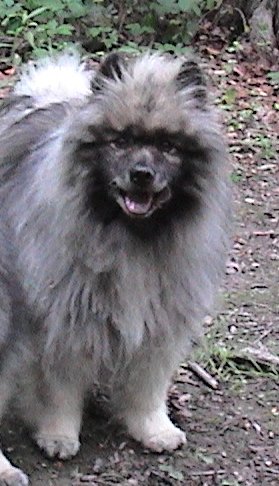

What is special about an old dog?

Attitude & Involvement
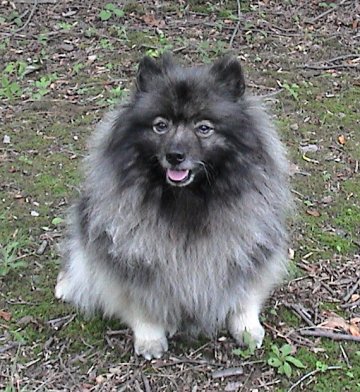

Vaccinations

Coat, Skin, and Feeding

Supplements

Unnecessary procedures

Grooming

When & how to say "goodbye"

Herbs to use
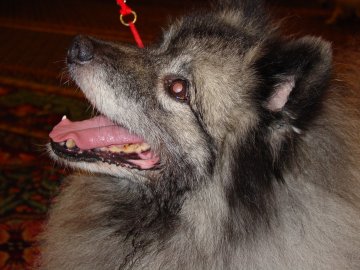
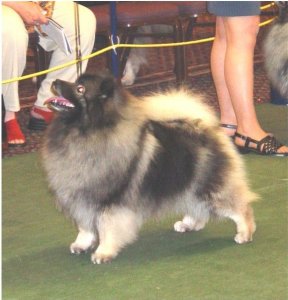
Click here to return to topics list.
